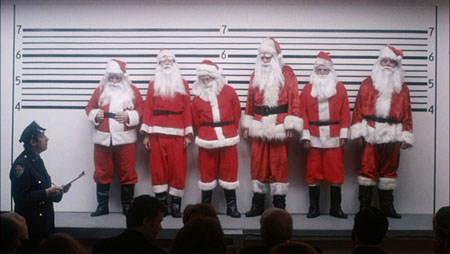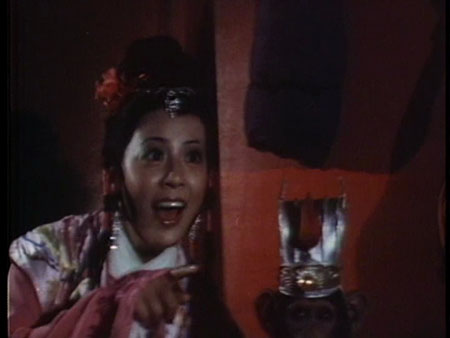AKA You Better Watch Out
DIRECTED BY: Lewis Jackson
FEATURING: Brandon Maggart
PLOT: After young Harry sees his father making love to his mother while dressed as Santa Claus, he grows up obsessed with jolly old St. Nick; one Christmas Eve, he snaps.

WHY IT WON’T MAKE THE LIST: Christmas Evil has a few nice, weird little touches scattered throughout. Several times the film seems to switch perspective from an objective view to Harry’s skewed subjective view without giving the audience notice. The darkly witty Santa lineup scene, the out-of-left-field Frankenstein homage, and of course the memorable final shot, where Harry completely breaks with reality and takes the viewer with him, are memorable enough. There is also an eerie atmosphere throughout, helped greatly by an unsettling electronic score. Unfortunately, there aren’t enough such high points to justify placing Christmas Evil on the overall list of 366.
COMMENTS: Christmas Evil is a serious character study—or, at least, an honest attempt at a serious character study—of a middle-aged loser who lives in a dangerous fantasy world of his own making. There are many little subtle details (catch, for example, the vintage Santa poster depicting St. Nick as a forbidding judge with a gavel) that provide a black comedy feel. On the other hand, it’s very slow to get started and the cheapness of the production often shows to its disadvantage–there’s one terrible editing glitch at the company Christmas party that’s so obvious and jarring, it suggests a loss of financing during post-production. Overall, it’s not nearly as bad as detractors would have it, or as as good as its few defenders (like John Waters) would like to believe. If Christmas Evil were a gift in your stocking, it wouldn’t be a lump of coal, or the keys to a new Mitzubishi Lancer; it would be a pair of cheap but comfy socks in a crazy color scheme that’s not to everyone’s taste.
When it debuted, Christmas Evil (then known as You Better Watch Out) was an oddity: the first film to depict the previously jolly ol’ St. Nick as a homicidal killer. Since then, the holiday vidscreens have been decked with Santa-slasher dreck such as Santa Claws (1996), Santa’s Slay (2005), and the Silent Night, Deadly Night series (1984-1991, with a remake on the way), greatly diminishing the novelty of a psycho Santa. Christmas Evil has little in common with it’s bloody progeny, and is probably the best entry in the sleazy sub-genre it inspired.
WHAT THE CRITICS SAY: “…the best seasonal film of all time. I wish I had kids. I’d make them watch it every year and, if they didn’t like it, they’d be punished!” -John Waters, Crackpot





